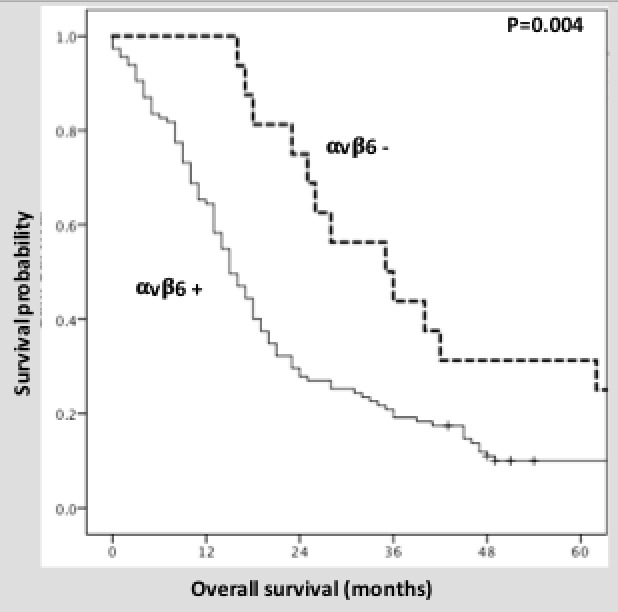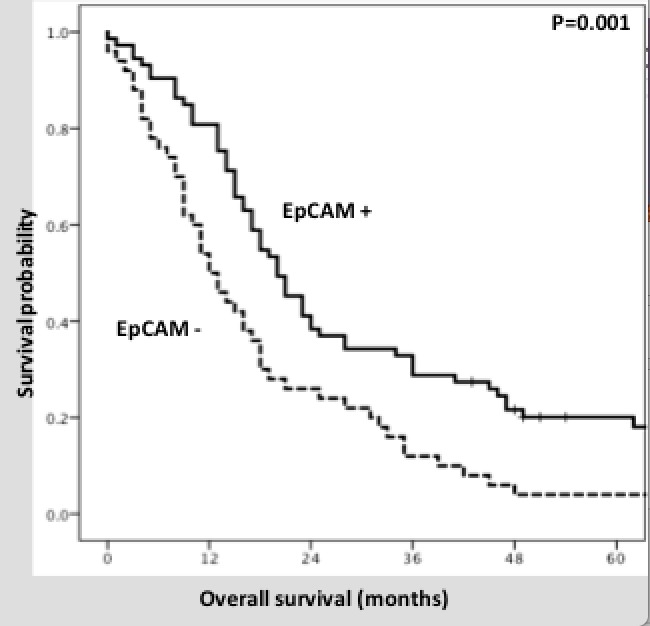
|
 |
Back to 2017 Posters
INTEGRIN ΑVΒ6, CMET AND LOSS OF EPCAM EXPRESSION ARE PREDICTORS OF POOR SURVIVAL: FIRST STEPS TOWARDS TARGETING THE EPITHELIAL TO MESENCHYMAL TRANSITION IN PANCREATIC CANCER PATIENTS
Susanna W. de Geus*, Alexander L. Vahrmeijer, J. S. Mieog, Rutger-Jan Swijnenburg, Hendrica A.J.M. Prevoo, Hans Morreau, Bert A. Bonsing, Cornelis J.H. van de Velde, Peter J.K. Kuppen
Surgery, Leiden University Medical Center, Leiden, Netherlands
Background: Multimodality therapy is considered standard of care for pancreatic cancer patients with loco-regional disease. This currently results in median survivals of 17-26 months on average in the fortunate patients eligible for surgery, illustrating the need for novel therapeutic strategies. The epithelial to mesenchymal transition (EMT) is a critical biological process by which epithelial cells lose adhesive properties, and obtain migratory and invasive features to be converted in mesenchymal cells. This transformation typically takes places during early embryonic morphogenesis, and wound healing. Nonetheless, EMT has also been noted during carcinogenesis, in particular in association with tumor cell invasion leading to metastatic dissemination. The aim of the present study was to evaluate the clinical significance of EMT-related biomarkers in pancreatic cancer.
Methods: Immunohistochemistry was used to evaluate the expression of integrin αvβ6, epithelial cell adhesion molecule (EpCAM), epithelial growth factor receptor (EGFR), hepatocyte growth factor receptor (cMET), human epidermal growth factor receptor (HER2), vascular endothelial growth factor receptor 2 (VEGFR2), and vimentin expression in surgical specimens from 137 pancreatic adenocarcinoma. For the purpose of this study immunohistochemical staining was considered positive if > 10% of the tumor cells expressed a medium or dark staining pattern. Survival analysis for overall (OS) and disease-free (DFS) survival was performed using the Kaplan-Meier method.
Results: Integrin αvβ6, EpCAM, EGFR, cMET, HER2, VEGFR2, and vimentin expression was observed in 88%, 59%, 69%, 88%, 80%, 72% and 60% of pancreatic cancer patients, respectively. Increased EGFR expression was associated with integrin αvβ6 (p=0.006), vimentin (p<0.001), and EpCAM (p=0.004) expression. EpCAM was correlated (p=0.047) with VEGFR2 expression. Patients with integrin αvβ6 (median OS, 15 vs. 35 months; log-rank p=0.004), cMET (median OS, 15 vs. 41 months; log-rank p=0.001), and loss of EpCAM (median OS, 12 vs 20 months; log-rank p=0.001) expression had a significant shorter OS. Integrin αvβ6 (median DFS, 12 vs. 20 months; log-rank p=0.038), cMET (median DFS, 12 vs 36 months; log-rank p=0.002), and loss of EpCAM (median DFS, 9 vs. 16 months; log-rank p=0.002) expression were also predictors for decreased DFS. EGFR, HER2, and VEGFR2 expression were not associated with OS or DFS.
Conclusions: Our results indicate that expression of integrin αvβ6, cMET and loss of EpCAM expression are significant prognostic biomarkers in pancreatic cancer. Further research must show if these biomarkers may have a role as therapeutic target.

Kaplan-Meijer survival curve for resected pancreatic adenocarcinoma patients by integrin αvβ6 expression.

Kaplan-Meijer survival curve for resected pancreatic adenocarcinoma patients by EpCAM expression.
Back to 2017 Posters
|



